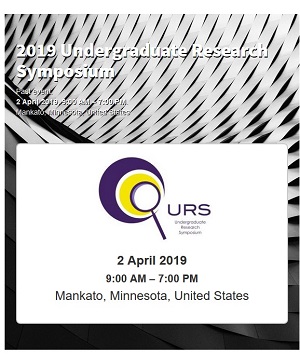Deception Detection and the Role of Gender in Determining Truthfulness
Location
CSU Ballroom
Start Date
2-4-2019 2:00 PM
End Date
2-4-2019 3:30 PM
Student's Major
Psychology
Student's College
Social and Behavioral Sciences
Mentor's Name
Emily Stark
Mentor's Department
Psychology
Mentor's College
Social and Behavioral Sciences
Description
(Shaw & Lyons, 2017). This study aimed to look at these claims within the context of employment. Participants watched a series of videos containing simulated job interview questions pertaining to different skill sets commonly asked for. Individuals in the videos answer truthfully or deceptively and it is the objective of the participant to determine the sincerity, likeability, trustworthiness, and willingness to hire each person in the video series along with whether the individual told the truth or not. After participants viewed the videos, they filled out an attitudes and personality scale. Data analysis for this experiment is still in the process. Our study specifically looks at how gender impacts lie detection and the ability to evaluate an individual's trustworthiness, likeability, and hireability. We hypothesize that the results will show us that women who lie are rated more highly overall on the likeability, trustworthiness, and hireability scales than men who lie, but men who tell the truth are rated more highly than women who tell the truth. We believe that studying lie detection in employment practices is important to apply to real world interviewing, determining whether or not interviewees are being honest when being considered for job opportunities, therefore adding integrity to the company and workplace.
Deception Detection and the Role of Gender in Determining Truthfulness
CSU Ballroom
(Shaw & Lyons, 2017). This study aimed to look at these claims within the context of employment. Participants watched a series of videos containing simulated job interview questions pertaining to different skill sets commonly asked for. Individuals in the videos answer truthfully or deceptively and it is the objective of the participant to determine the sincerity, likeability, trustworthiness, and willingness to hire each person in the video series along with whether the individual told the truth or not. After participants viewed the videos, they filled out an attitudes and personality scale. Data analysis for this experiment is still in the process. Our study specifically looks at how gender impacts lie detection and the ability to evaluate an individual's trustworthiness, likeability, and hireability. We hypothesize that the results will show us that women who lie are rated more highly overall on the likeability, trustworthiness, and hireability scales than men who lie, but men who tell the truth are rated more highly than women who tell the truth. We believe that studying lie detection in employment practices is important to apply to real world interviewing, determining whether or not interviewees are being honest when being considered for job opportunities, therefore adding integrity to the company and workplace.
Recommended Citation
Lyng, Tayle and Kevin Sperle. "Deception Detection and the Role of Gender in Determining Truthfulness." Undergraduate Research Symposium, Mankato, MN, April 2, 2019.
https://cornerstone.lib.mnsu.edu/urs/2019/poster-session-B/16




